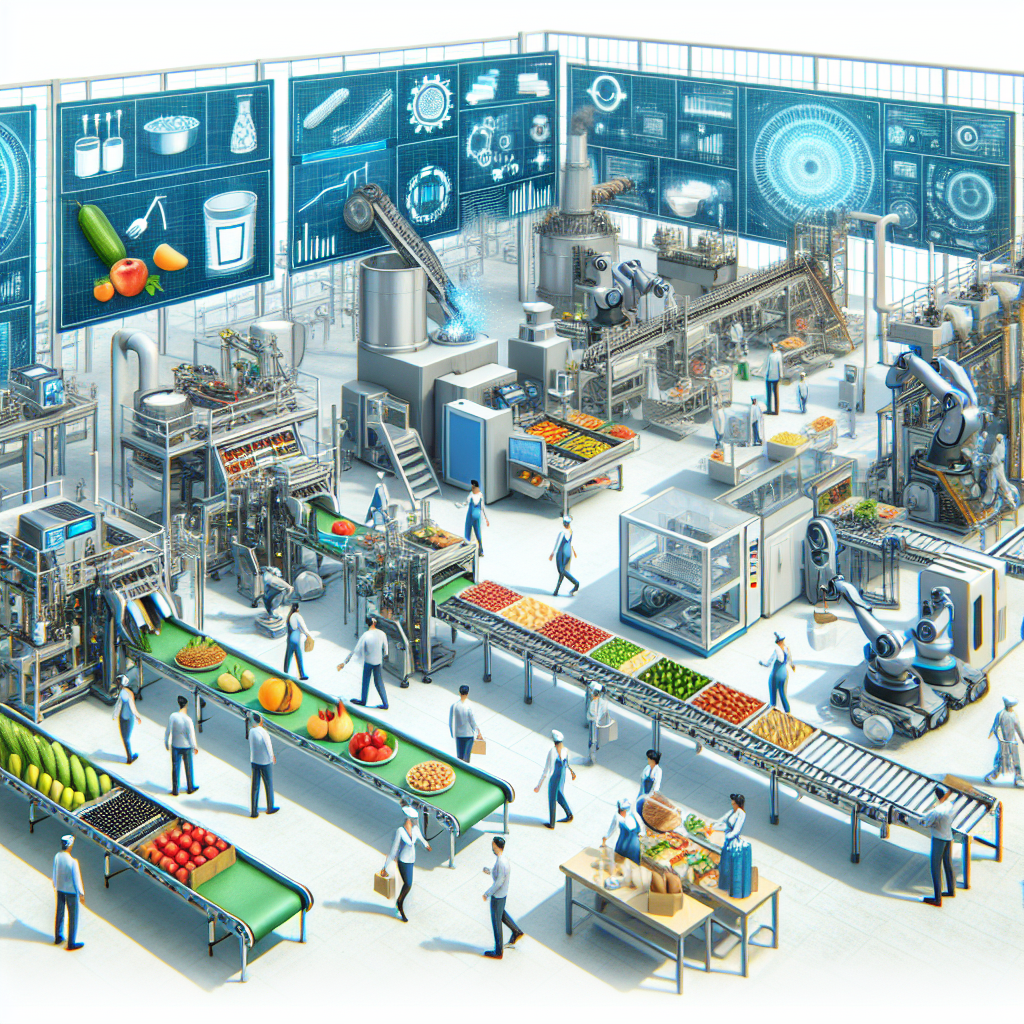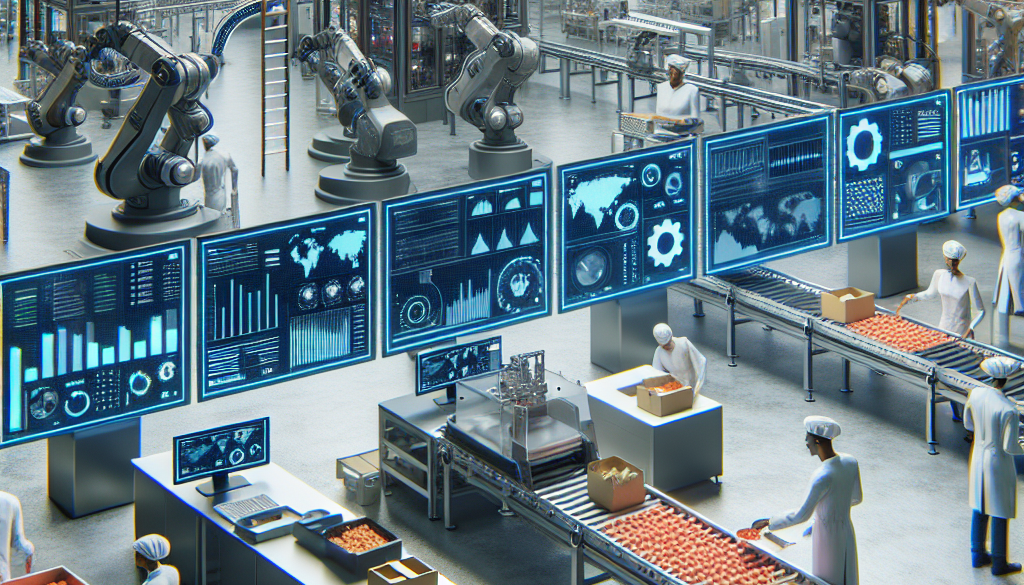Transforming Food Processing Industry Through Industry 4.0
-
Table of Contents
- Industry 4.0 Revolutionizing the Food Processing Sector
- The Integration of Industry 4.0 in Food Processing
- Advancements in Food Processing Through Industry 4.0
- Smart Manufacturing and IoT
- Big Data and Analytics
- Robotics and Automation
- Blockchain for Supply Chain Management
- Impact of Industry 4.0 on Food Processing
- Enhanced Operational Efficiency
- Improved Food Safety and Quality
- Sustainability and Waste Reduction
- Personalization of Food Products
- Statistics Supporting Industry 4.0 in Food Processing
- Challenges and Considerations
- Conclusion: Embracing Industry 4.0 for a Better Future
- ETprotein: Enhancing Food Processing with High-Quality Protein Products
Industry 4.0 Revolutionizing the Food Processing Sector

The food processing industry stands on the brink of a revolution, with Industry 4.0 technologies poised to transform every aspect of production, from supply chain management to manufacturing and beyond. This transformation is not just about efficiency; it’s about meeting the evolving demands of a growing global population and the increasing need for sustainability in food production. In this article, we’ll explore how Industry 4.0 is reshaping the food processing industry and the benefits it brings to the table.
The Integration of Industry 4.0 in Food Processing
Industry 4.0, also known as the Fourth Industrial Revolution, refers to the current trend of automation and data exchange in manufacturing technologies. It includes cyber-physical systems, the Internet of Things (IoT), cloud computing, and cognitive computing. When applied to food processing, these technologies can lead to significant improvements in various areas:
- Supply Chain Transparency
- Production Efficiency
- Food Safety and Quality
- Energy and Waste Reduction
- Customization and Personalization
Advancements in Food Processing Through Industry 4.0
Industry 4.0 is not just a buzzword; it’s a suite of technologies that are making real changes in the food processing industry. Here are some of the key advancements:
Smart Manufacturing and IoT
Smart manufacturing systems equipped with IoT devices can monitor and adjust production processes in real-time. Sensors can track everything from temperature and humidity to equipment performance, ensuring optimal conditions for food processing and reducing downtime due to machinery failure.
Big Data and Analytics
With the vast amount of data generated by smart systems, food processors can use big data analytics to gain insights into their operations. This can lead to better decision-making, predictive maintenance, and even predictive analytics for consumer preferences.
Robotics and Automation
Robotic systems are increasingly being used to handle repetitive tasks, such as packaging and sorting, which not only improves efficiency but also reduces the risk of contamination by minimizing human contact with food products.
Blockchain for Supply Chain Management
Blockchain technology offers a secure and transparent way to track the journey of food products from farm to table. This can greatly enhance traceability, which is crucial for food safety and quality assurance.
Impact of Industry 4.0 on Food Processing
The impact of Industry 4.0 on the food processing industry is multifaceted, affecting everything from operational efficiency to customer satisfaction:
Enhanced Operational Efficiency
Automation and real-time monitoring lead to faster production times and reduced waste, which in turn can significantly lower costs.
Improved Food Safety and Quality
Advanced tracking and monitoring systems ensure that food safety standards are met consistently, reducing the risk of foodborne illnesses and recalls.
Sustainability and Waste Reduction
Industry 4.0 technologies help in optimizing resource use, leading to more sustainable production practices and a reduction in food waste.
Personalization of Food Products
Data analytics can help manufacturers understand consumer preferences better, allowing for more personalized and niche food products.
Statistics Supporting Industry 4.0 in Food Processing
Recent studies and reports highlight the growing adoption of Industry 4.0 technologies in the food processing industry:
- A report by MarketsandMarkets predicts that the smart food market will reach $26.34 billion by 2025, growing at a CAGR of 8.4% from 2020 to 2025.
- According to a survey by PwC, 85% of companies in the food and beverage industry are already implementing or planning to implement Industry 4.0 solutions.
- The Global Food Traceability Center states that the use of traceability technologies can reduce food fraud by up to 30%.
Challenges and Considerations
While the benefits of Industry 4.0 are clear, there are challenges to its implementation:
- High initial investment costs for small and medium-sized enterprises (SMEs).
- Concerns over data security and privacy.
- The need for skilled workers who can manage and analyze data from smart systems.
Conclusion: Embracing Industry 4.0 for a Better Future
The food processing industry is undergoing a significant transformation thanks to Industry 4.0 technologies. By embracing these advancements, companies can improve efficiency, ensure food safety, reduce waste, and meet the personalized needs of consumers. While challenges exist, the potential benefits make the journey towards Industry 4.0 an essential step for the future of food processing.
ETprotein: Enhancing Food Processing with High-Quality Protein Products
In line with the advancements of Industry 4.0, ETprotein is at the forefront of providing high-quality protein products that cater to the evolving needs of the food processing industry. Their range of organic and non-GMO protein powders, including rice, pea, and seed-based proteins, are ideal for companies looking to innovate and improve their product offerings.
ETprotein’s commitment to quality and sustainability aligns with the goals of Industry 4.0, making them a valuable partner for food processors seeking to transform their operations and products.
About ETprotein:
ETprotein, a reputable protein and L-(+)-Ergothioneine (EGT) Chinese factory manufacturer and supplier, is renowned for producing, stocking, exporting, and delivering the highest quality organic bulk vegan proteins and L-(+)-Ergothioneine. They include Organic rice protein, clear rice protein, pea protein, clear pea protein, watermelon seed protein, pumpkin seed protein, sunflower seed protein, mung bean protein, peanut protein, and L-(+)-Ergothioneine EGT Pharmaceutical grade, L-(+)-Ergothioneine EGT food grade, L-(+)-Ergothioneine EGT cosmetic grade, L-(+)-Ergothioneine EGT reference grade and L-(+)-Ergothioneine EGT standard. Their offerings, characterized by a neutral taste, non-GMO, allergen-free attributes, with L-(+)-Ergothioneine purity over 98%, 99%, cater to a diverse range of industries. They serve nutraceutical, pharmaceutical, cosmeceutical, veterinary, as well as food and beverage finished product distributors, traders, and manufacturers across Europe, USA, Canada, Australia, Thailand, Japan, Korea, Brazil, and Chile, among others.
ETprotein specialization includes exporting and delivering tailor-made protein powder and finished nutritional supplements. Their extensive product range covers sectors like Food and Beverage, Sports Nutrition, Weight Management, Dietary Supplements, Health and Wellness Products, and Infant Formula, ensuring comprehensive solutions to meet all your protein needs.
As a trusted company by leading global food and beverage brands and Fortune 500 companies, ETprotein reinforces China’s reputation in the global arena. For more information or to sample their products, please contact them and email sales(at)ETprotein.com today.












